Ukraine war: Russia atrocities bring Nato members closer
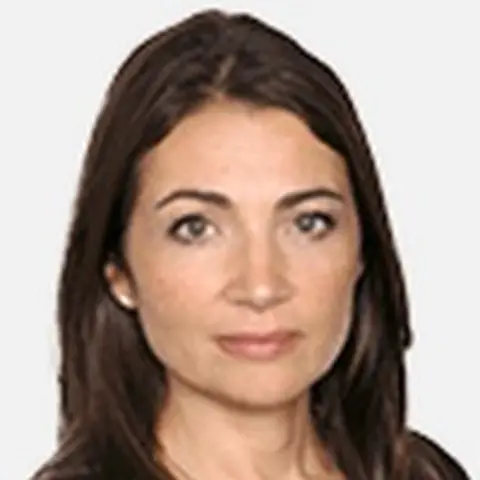
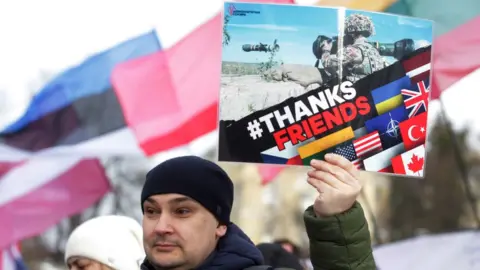 Getty Images
Getty ImagesNato is feeling pretty pleased with itself right now.
Of course when you chat to officials in the soulless, concrete monolith that is Nato HQ here in Brussels, no-one expresses pleasure at the current situation in Europe after Russia's invasion of Ukraine. But they are quick to tell you how surprised, amazed or encouraged they are that the alliance is so "very" united.
And that both transatlantic and EU-Nato co-operation on sanctions against Russia, for example, have been so smooth. This is far from always the case.
"If you'd asked me back in February, or even six months ago, there's no way I'd have predicted the unity we have in our ranks now," a US official in Brussels told me.
So what's the glue keeping Western allies together?
Just think of the countless headlines we've all read predicting the splintering of Western support.
"Ukraine fatigue" was heralded this summer, five months into the war.
Then the cost of living crisis and painfully high energy prices linked to Russia's invasion were tipped to reduce Western leaders' support for Kyiv.
With Russia having the largest stockpile of nuclear warheads in the world, it was assumed some countries would prefer to step away from Ukraine for fear of drastic action by Moscow.
But that was not the case.
"The strong resolve to stand with Ukraine that we see now has been helped by atrocities by Russia - targeting civilians and civilian infrastructure," a leading Nato official told me on condition of anonymity. Like many of the officials I spoke to, they would prefer to be able to speak more freely.
"A daily diet of war crimes, those images hitting our screens day after day. That makes it hard to turn away."
Russia has repeatedly denied committing war crimes.
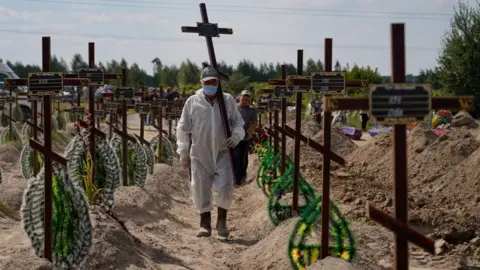 Getty Images
Getty ImagesWestern officials say the Kremlin's tactics have badly misfired.
"[Moscow] has tried to blackmail or manipulate nations supporting Ukraine with a 'we can make you suffer too' message," an official from a large Nato country told me.
"But it's royally backfired. Just like Russia has failed to wear down Ukrainian resolve with the daily war crimes it's imposing on the country."
Vladimir Putin's blaming of Nato's expansion eastwards for the current conflict has also turned into an own goal.
Sweden and Russia's neighbour Finland have opted to join the alliance, after decades preferring non-alignment, as a direct result of the Kremlin's actions.
Many officials also linked the unexpected advances of Ukraine's armed forces against Russia with strong Western support. Or, put more cynically, with making it politically far harder for allies to reduce that support.
Nato countries are juggling two forms of backing for Ukraine: the practical and the political.
The practical is focused on how to structure industries to be able to keep manufacturing and providing military support for Ukraine.
Nato officials say aid to Ukraine is more deliberate and long-term now than in the panicked first weeks following Russia's invasion.
But the alliance draws a deliberate line between military support it provides for its own members and Ukraine, where aid is decided and provided by the national governments of Nato members, not by the alliance as a whole.
This "gossamer-thin" distinction, as one Brussels-based diplomat put it to me, is not recognised by the Kremlin. But it is important to Nato as it desperately tries to avoid coming into a direct, and therefore escalating, conflict with nuclear power Russia.
So, Nato has considerably boosted defence capabilities for its "Eastern flank" of member countries geographically close to Russia, but the alliance says it has no organised mission inside Ukraine. It's not training Ukrainian soldiers or providing Kyiv with military support as an organisation.
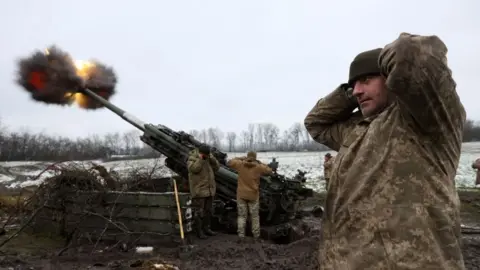 Getty Images
Getty ImagesThe political aspect of sustaining support for Ukraine is something the Nato member countries have to manage with their parliament and population back home.
Analysts say the cost of helping Ukraine is nothing compared with what the US or European countries like France or the UK spent in Iraq and Afghanistan, but it's worth looking at recent opinion polls in Germany, France and Italy.
They suggest waning public support (just 28% in France and Germany and 26% in Italy, according to a study by intelligence group Morning Consult) for ongoing sanctions against Russia that have a direct impact on the cost of living.
Yet the leaders of those countries appear unwavering for now in their support for Ukraine. Arguably more steadfast now in fact than earlier in the conflict.
What a contrast to the second Gulf War. Then Berlin and Paris didn't hesitate to opt out, prompted by strong anti-war sentiment at home.
So what's going on now?
Simple: Russia's assault on Ukraine is Europe's 9/11, says Camille Grand, until recently assistant secretary general for defence investment at Nato, and now at the European Council for Foreign Relations.
"[Russia's invasion] has been a massive wake-up call on defence and security," he told me. "A pivotal, game-changing moment, bringing conflict directly to our borders."
Whatever the outcome in Ukraine itself, he predicts the situation in Europe will remain complex - geopolitically and in terms of security - for years to come.
A US official in Brussels goes a step further: "What Russia did caused a paradigm shift for security calculations across the globe."
It wasn't just Nato recognising this, he said. Other democracies like Japan, New Zealand, South Korea and Australia see Vladimir Putin's actions as a serious threat to the democratic world order. There's a sense that if he is allowed to "get away with it" in Ukraine, then no-one is safe.
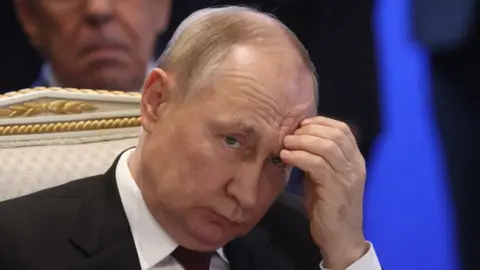 Getty Images
Getty ImagesNot everyone feels this way across the world, of course.
The West and its allies are also accused of hypocrisy and double standards, in their rush to defend Ukraine or call Russia out for war crimes, when Western forces were accused of human rights abuses and war crimes in Iraq, for example.
And the welcome offered to Syrian refugees arriving in Europe in 2015 was distinctly less widespread and effusive than that given to those fleeing war in Ukraine this year.
But back in February at Nato, the shock at Russia's invasion of Ukraine - and the concern about the wider implications if the Kremlin's actions went unchecked - prompted the US to drag itself away from its intended focus on China and the Indo-Pacific.
Reluctantly, its attention was back on Europe's military defence - even at the risk of that harming President Joe Biden in the recent mid-term elections (though it didn't seem to dent him in the end).
It was arguably that US resolve, in addition to Russia's actions in Ukraine, that then changed the tune at leadership level in France, Germany and Italy - seen at first by many as too soft on Russia.
Berlin and Rome had close business and energy ties to Moscow. And, to his critics, President Emmanuel Macron seemed seduced by what he perceived as a personal understanding with Vladimir Putin.
Fast forward to this autumn, and weapons-delivery shy Germany is now the fourth largest donor of military aid to Ukraine, though the US dwarfs European contributions to an eye-watering degree.
The EU has worked fast at member-state level and as a bloc to wean itself off energy dependency on Russia, and Mr Macron isn't mincing his words these days when it comes to Moscow.
"War crimes that cannot go unpunished" is how he described ongoing attacks on Ukrainian civilians and civilian infrastructure this week. Those attacks have left 75% of the capital Kyiv without power and water.
"We did have a few stragglers in the (Nato) waters at the beginning," a US official in Brussels told me. "But no longer."
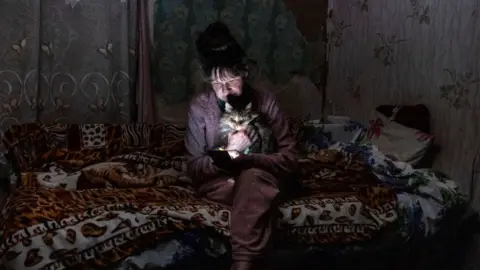 Getty Images
Getty ImagesAs for those oft-criticised, still occurring, one-to-one phone calls between German Chancellor Olaf Scholz and in particular President Macron, and Vladimir Putin?
"[The US] also has open lines of communication with Moscow. Not to discuss the future of Ukraine - that's up to the Ukrainians to decide - but to talk about other issues, like the nuclear question."
What of the longer term, I wondered. Sometimes it seems that Paris and Berlin think that when the crisis in Ukraine has ended it might be possible to go back to "business as usual" with Russia.
The US official said he doubted that. But you could legitimately ask whether it's ever feasible to talk about the future of European security and totally exclude Russia.
As we now head into what Europe fears could be a cold, hard winter, unlike earlier in the conflict, there is no whiff of any Nato big players musing about a negotiated settlement between Russia and Ukraine.
The common consensus is that the West recognises it forced Ukraine into disadvantageous peace talks with Russia in 2014, only for Moscow to come back for more in 2022.
Representatives of Nato countries helping Ukraine's military say they now see their role as supporting Kyiv to perform strongly militarily, so as to be in the most advantageous possible position when the time eventually comes to negotiate with Russia.
That is something President Volodymyr Zelensky says he's not remotely contemplating right now.
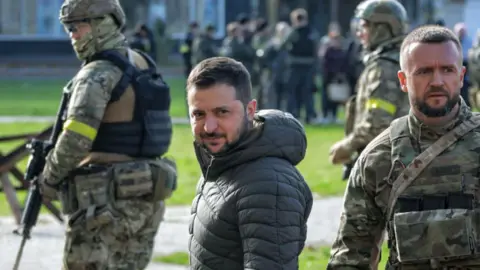 Getty Images
Getty ImagesTalk of Nato unity of purpose aside, it would be naive to believe no differences exist at all anymore between Ukraine's allies.
The UK is often described as having a more "hawkish" stance towards Moscow, alongside Nato members that are geographically closer to Russia or have a recent painful history with it - such as the Baltic States and Poland.
Germany is talked about these days as a "silent partner" that pays up and shuts up. The US is depicted as trying to keep the balance, internally within the alliance and externally, to avoid face-to-face military contact with Moscow.
These national differences are described as only "nuances" for now.
There are no easy outcomes to this conflict, says defence expert Camille Grand. Just a preferable one, which is Russia's defeat.
But how might Moscow then react? The challenge for all countries involved will surely be to make that end scenario manageable. Whatever it looks like.
